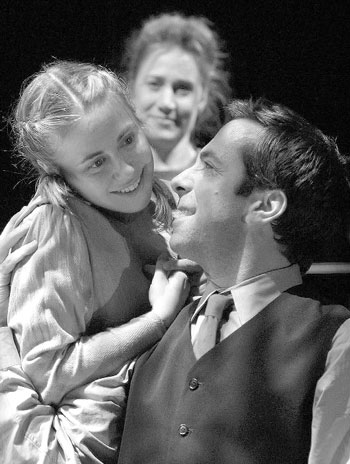By JERRY TALLMER
You can keep your Iago. For me, the most unlikable character in all drama is Gregers Werle, the idealistic, purifying manipulator who, in the name of “truth” and “a true marriage” — whatever that is — in Ibsen’s “The Wild Duck,” not only wrecks the reasonably tolerable make-do marriage of Gina and Hjalmar Ekdal, but in the process leads their 13-year-old daughter Hedvig, a sensitive young idealist of another sort, into an act of unforeseen tragic consequence.
“The Wild Duck” is not an easy play to do, or to like. The Internet lists five Broadway stagings of it since 1918, the last of them an APA-Phoenix production in 1967 (with Rosemary Harris and Betty Miller alternating as Gina). No records available for Off-Broadway, and no personal memories of the same either when it comes to “The Wild Duck.”
Nobody except an enthusiastic Bernard Shaw paid much attention when it opened in 1885, and Shaw put his finger right on the polar contradiction within this drama as well as between Ibsen and, say, a Charles Dickens:
In Ibsen, from beginning to end, every human being is a sacrifice, whilst to Dickens he is a farce. And there you have the whole difference. No character drawn by Dickens is more ridiculous than Hjalmar Ekdal in “The Wild Duck,” or more eccentric than old Ekdal [Hjalmar’s disgraced, nutty father], whose toy game-preserve in the garret is more fantastic than the house of Miss Havisham; and yet these Ekdals wring the heart whilst Micawber and Chivery . . . only shake the sides.
Old Ekdal’s “toy game-preserve in the garret” (in most translations, “the loft”) is where he and his granddaughter tend to the wild duck which has been shot down like Chekhov’s seagull, but also where the old man whangs away with his rifle at bears, real or imagined. Indeed, one might describe this whole quadrant of the play as nothing less than surreal. In 1885.
“Yes, yes!” says Eve Adamson, in agreement. It is Eve Adamson, founder and longtime artistic director of this city’s Jean Cocteau Repertory, who directs the production of “The Wild Duck” that’s at the Cocteau’s Bouwerie Lane Theatre through May 20. The way she and designer Robert Klingelhoefer solved the mysterious loft problem was through Plexiglas.
What intrusive Gregers Werle drives out into the terrible light of “truth” is that Hjalmar Ekdal is probably not young Hedwig’s real father; that person would far more likely be Werle Sr., the richest man in town, i.e., Gregers’s own aging father, whom he detests.
What makes Hjalmar ridiculous (see Shaw) is not that he’s a cuckold but a fumbling, dithering inventor who has invented nothing and never will. “Damn it, what’s left for me to invent? Other people have invented so much already,” two-bit photographer Hjalmar complains toward the end of the play, just before we learn the terrible truth of “The Wild Duck” — which, in short, is that TRUTH KILLS.
Ibsen places a more detached truth-telling in the mouth of Dr. Relling, the cynical realist who lodges upstairs and may take a nip or two now and again.
RELLING: It’s a shame that fellow [Gregers Werle] didn’t go straight to hell [when Werle worked up north, in the mines].
GINA EKDAL: Do you really think he’s crazy?
RELLING: No crazier than most. But he’s got a serious disease.
GINA: What’s wrong with him?
RELLING: An acute case of moralistic fervor.
HEDVIG: Is that a kind of disease?
RELLING: Oh yes, it’s a national disease. It breaks out now and then.
“I think that’s very pertinent at this particular time,” says director Adamson. “And Relling gets a good laugh on it too.”
He’s played by Cocteau stalwart Harris Berlinsky. (Ms. Adamson wanted fellow Cocteau leading lights Craig Smith and Elise Stone to be in the Ibsen, but they’ve been too busy with their two new children.) Gregers Werle is played by Chad Suitts, Hjalmar Ekdal by Michael Surabian, Gina by Angela Madden, Hedwig by Erin Scanlon, old Ekdal by Tim Morton, old Werle by Bill Fairbairn, and four other roles by Eileen Glenn, Danaher Dempsey, Allen Hale, and Sara Jean Asselin.
Eve Adamson says she and current Cocteau Rep artistic director David Fuller kicked various choices around for her to do this season, before settling on “The Wild Duck.” She’d directed three other Ibsens at the Cocteau over the years, “Ghosts,” “When We Dead Awaken,” and “Hedda Gsbler,” but never this one.
“We went back and forth on things David wanted me to do and I didn’t want to do.” For instance? “For instance, [Eugene O’Neill’s] ‘The Emperor Jones.’ I found it dated and racist and needing an actor they didn’t have” — namely, Paul Robeson. “I’d found a play I really like, Pete Shaffer’s ‘Shrivings,’ written during the Vietnam War, but Shaffer didn’t want it done in this country.
“Finally we said: ‘Oh well, let’s do ‘The Wild Duck,’ a good play by a good playwright with a lot to be discovered in it.”
And the basic thing discovered is Dr. Relling’s truth: People have to tell one another lies to get through life on an even keel. Have to tell lies to themselves too, up to a point anyway. “Hjalmar is desperately trying to maintain an image of himself that’s not realistic — but,” says Eve Adamson, “so do we all. He over-dramatizes himself. But then again, so do most of us.”
Gregers Werle would tear all that away, ruthlessly, all for the sake of “the truth.”
GREGERS: Will you believe I’ve wanted everything for the best, Mrs. Ekdal.
GINA: Yes, I think I believe that. But God have mercy on you all the same.
She’s kinder than I would have been.





























